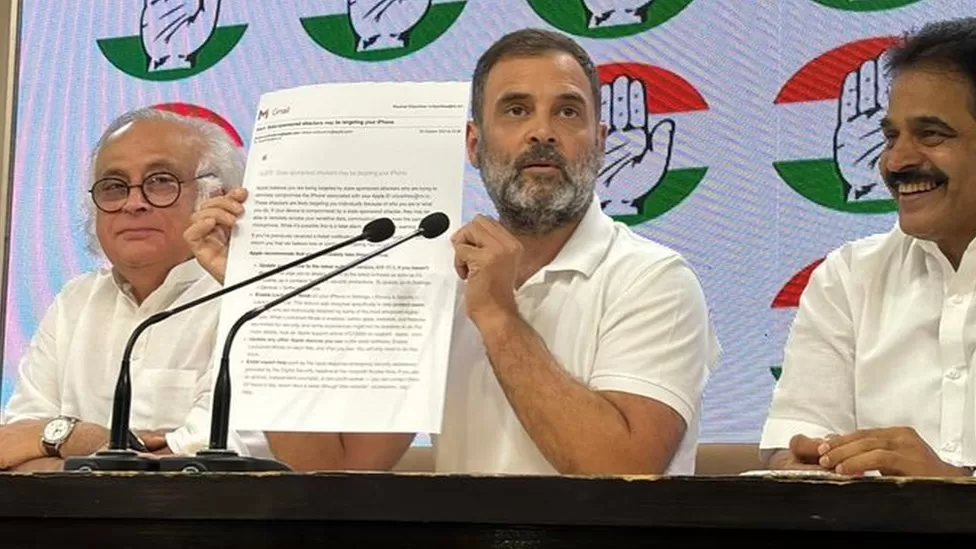Some Indian opposition leaders have accused the government of trying to hack into their phones after receiving warning messages from Apple.
Apple’s alert said it believed the recipient was “being targeted by state-sponsored attackers”.
It did not specify who the attackers could be.
When contacted by the BBC, Apple said that it did not attribute the threat notifications to any specific state-sponsored organisation.
Federal ministers dismissed the allegations, with one calling it “destructive politics”.
But he added that the government would “investigate to get to the bottom of these notifications”.
So far, around a dozen opposition politicians have confirmed that they got the message from Apple. The list has MPs including Shashi Tharoor and KC Venugopal from the Congress party, Mahua Moitra from the Trinamool Congress and Priyanka Chaturvedi from the Shiv Sena UBT.
Congress leader Rahul Gandhi also said that several people who worked in his office got the alert.
“We are not scared. You can do as much [phone] tapping as you want, I don’t care. If you want to take my phone, I will give it to you,” Mr Gandhi said at a press conference.
Some journalists – including Siddharth Varadarajan, a founding editor of news website The Wire – said they received the message too.
Federal information technology minister Ashwini Vaishnaw posted on X (formerly Twitter) that the government has asked Apple to join its investigation “with real, accurate information on the alleged state sponsored attacks”.
On its support page for users, Apple says that “state-sponsored attackers are very well-funded and sophisticated, and their attacks evolve over time”, adding that they target a “very small number of specific individuals and their devices”.
It also says that it can’t give more details about what prompts it to issue these threat notifications as “that may help state-sponsored attackers adapt their behaviour to evade detection in the future”.
Apple added: “Detecting such attacks relies on threat intelligence signals that are often imperfect and incomplete. It’s possible that some Apple threat notifications may be false alarms, or that some attacks are not detected.”
Technology analyst Prasanto K Roy told the BBC that companies such as Apple look for activity patterns to detect large-scale, co-ordinated malware attacks.
“Technically, it’s possible to attribute it to emerging or originating from a particular country. They can also narrow it down to known state-sponsored or state agencies,” he said, adding that Apple would not want to attribute it to any specific actor.
On Tuesday, Indian politicians and journalists shared screenshots on X of the message they received from Apple, with some pointing out that no member of the governing Bharatiya Janata Party (BJP) had confirmed receiving the notification yet.
“Funny that only opposition got the memo of surveillance, even the algorithm was selective in its choice!” Ms Chaturvedi wrote on X.
But later in the day, BJP minister Rajeev Chandrasekhar said that his colleague Piyush Goyal had also received the alert.
“Apple has to answer a number of questions about these devices they claim are secure,” he told NDTV news channel.
Aam Aadmi Party MP Raghav Chadha, who says he also got an alert, connected it to the general election due next year.
“It must also be placed within the broader attacks on the opposition who are facing relentless repression by investigatory agencies, politically motivated criminal cases and incarceration,” he said.
BJP leaders said allegations of the government’s involvement were “baseless” and that it was up to Apple to clarify what it meant by the notification.
“The opposition does not have any issue to take on the government and, therefore, they are resorting to making these false allegations,” said Amit Malviya, who looks after the BJP’s IT department.
Ms Chaturvedi released a letter addressed to Prime Minister Narendra Modi, urging him to investigate “who, within the ‘state’, is engaged in attempting to access my phone”.
Several opposition leaders in India had earlier accused Mr Modi’s government of placing them under surveillance.
In 2019, WhatsApp said in a lawsuit that Indian journalists and activists were among those targeted by Pegasus, a surveillance software made by Israeli firm NSO Group. NSO has said that it only works with government agencies.
In 2021, Indian website The Wire reported that more than 300 numbers on a leaked database of thousands of phone numbers – listed by government clients of NSO – belonged to Indians.
And last year, a political storm broke out after the New York Times reported that India had acquired Pegasus from Israel as part of a defence deal in 2017.
Mr Modi’s government has denied purchasing the spyware, which can infect smartphones without users’ knowledge and access virtually all their data.
Source : BBC
















